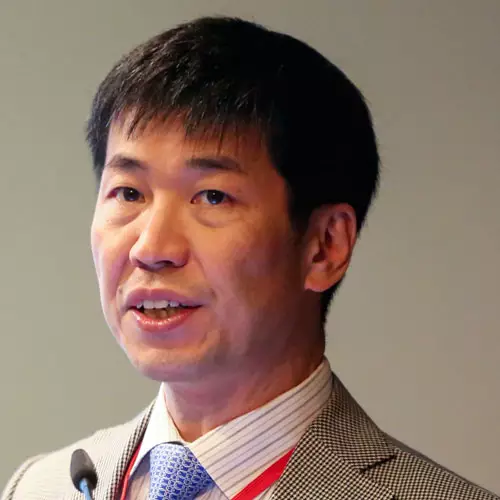编者按:2015年6月27日,在第十届全国胃癌学术会议的开幕式后的大会主题报告中,来自北京大学肿瘤医院的季加孚院长和沈琳教授、来自日本的Takeshi Sano教授和Toshikazu Ushijima教授、来自韩国的Sung Hoon Noh教授和Han Kuang Yang教授分别做了精彩学术报告。《肿瘤瞭望》采访了Han Kuang Yang教授和Takeshi Sano教授,并整理了Toshikazu Ushijima教授的报告内容,与读者分享:
幽门螺旋杆菌导致的DNA 甲基化异常可作为肿瘤风险标志物
Aberrant DNA Methylation Induced by H. pylori Infection, and Its Use as a Cancer Risk Marker

Toshikazu Ushijima 日本国家癌症研究所
遗传学和表观遗传学研究表明,表观遗传学对胃癌影响严重。一般而言,全基因组外显子如WNT信号传递和细胞周期调控等的基因突变率是非常低的,但却频繁地受到甲基化异常的影响。这可能表明DNA 脱甲基化对胃癌治疗或许有效, 目前其临床前研究正在深入开展中。
异常的DNA 甲基化不仅存在于癌症组织也存在于非肿瘤组织周围。集聚在胃上皮的异常DNA甲基化与胃癌患者的发病风险密切相关。这样的集聚会产生一个癌化领域(表观遗传学癌化领域)。引起慢性胃炎的幽门螺杆菌是引起DNA 甲基化的重要诱导物。慢性炎症引起的DNA甲基化不是随意的而是特定的。涉及许多内含子基因和一些外显子基因,像CDKN2A、CHFR、CDH1、MIR34B和SFRP1等。除了这些经典的抑癌基因,我们发现核染色质如ACTL6B和SMARCA1重组,表观遗传学癌化领域的形成也不例外。为了明确癌化领域,研究组将胃癌患者内镜治疗后,进行了一项多中心前瞻性群组研究,来预测异时性胃癌患者的高风险度。通过三年随访782 例患者,发现异时性胃癌患者胃组织内的甲基化水平增高了2.3倍。现在,另一个针对幽门螺杆菌根治后的健康人的大规模的多中心前瞻性群组预测研究已经启动,以明确胃癌的发展机理。
总之,“幽门螺杆菌感染”——“甲基化感应”——“胃癌”,这一机制具有非常重要的胃癌诊断、治疗和预防价值。胃癌的这个机制也可作为范例来明确另一些组织中炎症引起的肿瘤机制。
Comprehensive genetic and epigenetic analysis has confirmed that gastric cancer is heavily influenced by epigenetic alterations. Novel mutated genes identified by whole-genome or exome studies had only a low frequency while critical pathways, such as WNT signalling and cell cycle regulation, were frequently affected by aberrant DNA methylation. This suggests a possibility that DNA demethylation therapy may be effective in gastric cancer, and preclinical studies are now being intensively conducted.
Aberrant DNA methylation is not only present in cancer tissues but also accumulated in surrounding noncancer tissues. The accumulation levels of aberrant DNA methylation in gastric epithelium are correlated with the risk of gastric cancer, and such accumulation thus is considered to produce a field for cancerization (an epigenetic field for cancerization). As an inducer of aberrant DNA methylation, chronic inflammation triggered by H. pylori infection is critically important. Genes methylated by chronic inflammation are not random but specific, and involve many passenger genes and a small number of driver genes, such as CDKN2A, CHFR, CDH1, MIR34B, and SFRP1. In addition to these classical tumor-suppressor genes, we recently identified that chromatin remodelers, such as ACTL6B and SMARCA1, are also involved in formation of an epigenetic field.
To use the concept of epigenetic field can cerization, we conducted a multicenter prospective cohort study to predict high risk patients for metachronous gastric cancer after endoscopic treatment of a gastric cancer. After a three-year follow-up of 782 patients, it was demonstrated that patients with high methylation levels in gastric tissues have a 2.3-fold higher risk of developing a metachronous gastric cancer. Now, another large-scale multicenter prospective cohort study to predict who will develop gastric cancer among healthy individuals after H. pylori eradication has been initiated.
In conclusion, the "H. pylori infection"-"methylation induction"-"gastric cancer" sequence has important diagnostic, therapeutic, and prevention opportunities for gastric cancer. Gastric cancer can also serve as a model to tackle any inflammation associated cancers of other tissues.





 京公网安备 11010502033352号
京公网安备 11010502033352号